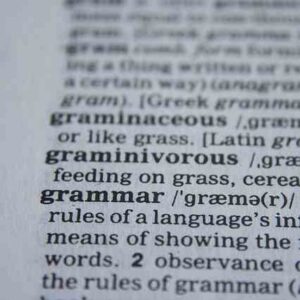Basic Grammar Problems
Seth Godwynn
People often ask what are the most common basic problems of grammar. Sadly, there are no such things. The basic problems we see with people’s writing are simply basic grammar problems. There’s no magic bullet. There aren’t three or four weak areas that can be fixed to turn someone from an amateur to a professional.

The first, most obvious problem we see is spelling mistakes. This is a very damning sign that you are not ready to be calling yourself a writer. I’m not a great speller myself, I often struggle with some words, no matter how many times I write them. My brain doesn’t work that way, and I’m sure many people can sympathise. So, what I’ve been forced to do is make a conscious effort to get better. I’ve taken my poor spelling and I’ve repeatedly driven myself to improve until I look vaguely like a professional. But, what makes this a serious indicator that you’re not professional is that every word processing application has a spell-checker built in. If you can’t spell, and can’t use your own software, then you’ve clearly got some work to do.
The other way people misspell words is by using the wrong ones. Although this seems hard to believe, we see many commonly confused words put into drafts of novels. Examples are accept and except, effect and affect, through and threw. Yes, English is complicated, but there is no excuse for a writer not to use it properly. We wouldn’t be impressed if an airline pilot turned up to work and didn’t know what a wing was, or if your takeaway turned up and the makers hadn’t observed the basic tenets of food hygiene. That one happens to me rather a lot, and I can promise that I’m often highly unimpressed by it.

One of the worst examples of grammatical incompetence is where similar words are used in the wrong context. The most obvious of these is to, too and two, and there, they’re and their. There are many more and if you’re using them incorrectly, it’s a huge warning to your readers that you’re not really a writer. If you think that’s a harsh sentence, throw yourself to an audience and see how they treat you.
One of the more subtle issues is punctuation. We often see full stops used incorrectly, or not at all. Commas, semi-colons, question and exclamation marks all have a specific job to do. Commas are most frequently abused in their role of connecting clauses, since people seldom know how to identify the boundaries of clauses and, therefore, don’t know where they’re meant to sit.
Sentences require a subject. They have to be about something. The subject can be you or I and it could be an object, time, place or idea. It doesn’t matter what it is, but a sentence has to have one. Often, writers forget that and put out sentences that simply have actions, without connecting those actions to the thing meant to be performing them.
Subjects and verbs have to agree. Think of it as being like a marriage, and I’m sure many of us can sympathise with just how difficult things become when things that are meant to agree don’t. It’s a common error among school-children, but really shouldn’t be among aspiring authors.
One of the less obvious mistakes, but one that always shows a lack of experience, is repetition. Often, the same word will be used too many times in too short a section. As a general rule, descriptive words, especially, should be varied and used sparingly. We don’t want to see them repeated in the same sentence and, ideally, not in the same paragraph. It suggests a lack of vocabulary and looks amateurish. It’s a way to ensure your work won’t be taken seriously. Presumably, that’s not what you want.
Tenses are very important. A lot of new writers stray from one to another. Remember, there are past, present and future tenses. You must stick to one when you write. Your writing will normally be in the past tense, your synopsis must be in the present. Your pitch will shift between the three as you describe various positions. But, fictional work should remain anchored in one tense, and if you slip, your audience will slip too. Most often, they’ll slip away entirely, and they won’t be coming back.
Further to the three main tenses, there are more complex additions to each, such as perfect and continuous. Each has a specific role and needs to be understood. If you get them wrong, it’s like waving a gigantic flag over your work that has the word ‘amateur’ written across it.
To put it simply, you’re never going to find a short article that covers all of the common grammatical errors you might have in your own writing. The only answer is to read widely and study your art carefully. Writing is a craft, not an easy-option, and it takes time to master.
While researching this article, I found a post on a forum. A sixteen year old girl said she had written two books but couldn’t figure out how to sell them. Her post was littered with spelling and grammatical errors and it’s not unlikely that her books were too.
You might think that writers are supportive of one another, and for the most part, they are. But readers are not, and publishers are outright hostile. A young lady like this has no chance until she can learn to put together a post that is grammatically correct.

We’re wasting our time if we’re trying to get our work published before we can use basic grammar.
When a publisher is checking your submission, they’re looking to see if it hooks them, certainly, but they’re also looking for a reason to reject it. If your first paragraph contains a single mistake, your dreams die right there.
You must master the basics of grammar before hoping to move on.
There is no alternative.
Many thanks for reading this article. We hope it was interesting, informative and entertaining. Follow us on social media or share our content on your own pages. It helps us grow so we can create more free content to help you.
